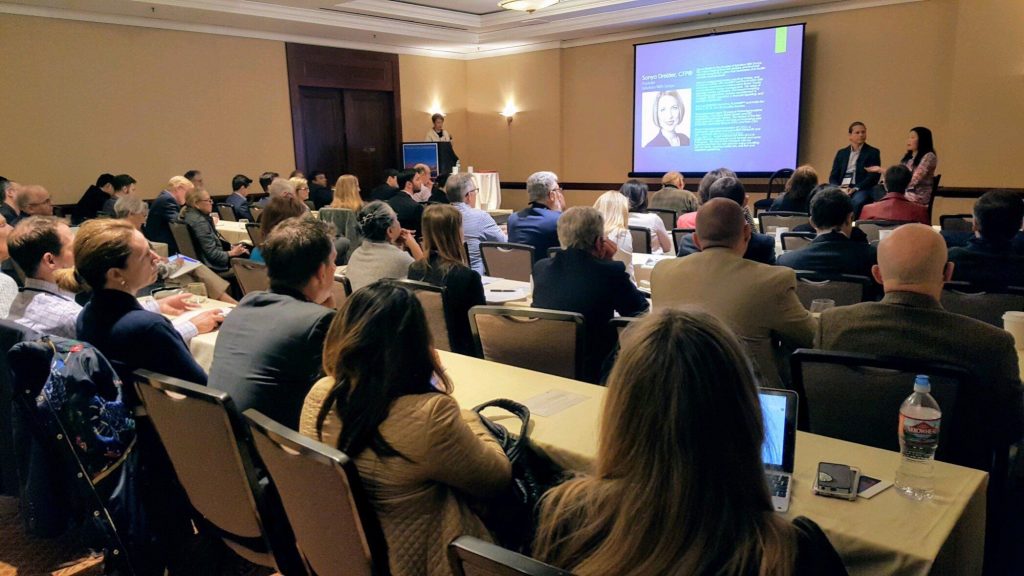Impact Investors’ Principal Advisors Catherine Woodman and Shane Yonston have recently been invited to speak at industry conferences as experts in Sustainable, Responsible, Impact (SRI) investments, to share their combined 30 years of experience serving investors with this focus.
Earlier this year, the Financial Planning Association’s (FPA) Northern California region had its 45th annual conference in May, where Shane Yonston, alongside fellow panelists and industry leaders Sonya Dreizler and Justina Lai, spoke about the benefits of adding impact-oriented investments to an advisory practice (see photo below). They presented to over 100 financial advisors, addressing the considerations of incorporating environmental, social, and governance (ESG) criteria into their portfolios, best practices for due diligence on funds and private equity offerings, and how to balance investor’s personal values with a prudent approach that can also achieve financial return and risk objectives.

The FPA NorCal Conference has been providing advanced educational sessions for advisor members and affiliated financial professionals for 45 years. According to their website, “this premier Conference has a national reputation for providing knowledgeable inspiring speakers and excellent networking opportunities for the more than 600 financial professionals who attend each year.”
Shortly thereafter, Catherine Woodman was a featured speaker in mid-June at the Chartered Alternative Investment Association’s (CAIA) San Francisco Educational Event: Impact and ESG Investing.
Catherine’s panel, “Do ESG/SRI funds outperform?”, consisted of four top-level ESG/SRI asset managers and investors, discussing how both institutional and retail investors are pushing for more active consideration of the impacts their portfolios have, such as environmental damage, fair treatment of workers, as well as governance issues like proper transparency. In an hour-long, well-attended session they conveyed the risk and return characteristics of socially responsible funds as compared to the broader market, commenting on whether they truly offer alpha, and why that may be. They also addressed the commonly-voiced concern investors may have about “greenwashing”, offering ways to safeguard from that by seeking to understand their investment impact.
Later this month Yonston has been invited to address the National Association of Personal Financial Advisors (NAPFA) on impact investment strategies and in November he will be a featured speaker and panelist organizer at the 28th annual SRI Conference, sharing the “How Tos” for advisors looking to shift their focus toward greater impact, as well as advising foundation and endowment boards on how to incorporate SRI into their portfolios. We should note that, as the premier North American conference for the sustainable, responsible, impact (SRI) investment industry, several hundreds of financial professionals and industry practitioners will attend The SRI Conference to learn and network with colleagues, and to grow and deepen their professional understanding of how to make money and make a difference at the same time.
We’re humbled to be looked to amongst peers as knowledgeable in the SRI field, with something to add to this fast-moving and dynamic industry, and we’re excited to be helping other advisors to better address their client’s desire for more ethical and sustainable portfolios. Over the years we’ve seen that many times, investment advisors will deter their clients from investing with SRI funds partially because they do not know enough about it. In this way, there is a big gap between what investors want and what they are receiving, which is a real opportunity for us to form a bridge and better direct the flow of capital to reflect the true supply and demand of the marketplace.
If your organization is interested in learning more about how to utilize socially responsible investment strategies to achieve both financial and social benefits, please feel free to contact us about attending a future event or customizing one for your group.
*Investing involves risk. Depending on the types of investments, there may be varying degrees of risk. Investors should be prepared to bear loss, including total loss of principal. Socially responsible investing does not guarantee profit or help protect against loss.
